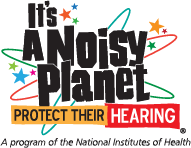Because an important cause of hearing loss is loud noise, many parents are concerned that their children may be damaging their hearing by listening to music with earbuds. The Healthcare Policy Podcast explored how the National Institute on Deafness and Other Communication Disorders (NIDCD), part of the National Institutes of Health, is working to reduce noise-induced hearing loss. Podcast producer David Introcaso interviewed NIDCD Director James F. Battey, Jr., M.D., Ph.D., in early January 2017. [Dr. Battey retired in 2018.]
“There’s nothing wrong with earbuds that are producing sound at a low, nontoxic level. But earbuds are bad when you turn them up too loud,” said Dr. Battey. "My rule of thumb is, if an individual is standing at arm's length from you and they can hear your earbuds…that noise is probably too loud, and if delivered for a long enough time will cause noise-induced hearing loss."
Preventing noise-induced hearing loss is a priority for the NIDCD. The institute’s It’s a Noisy Planet. Protect Their Hearing.® campaign, which is aimed at children aged 8 to 12 and their parents and other caregivers, raises awareness about prevention. Noisy Planet emphasizes three key messages:
- Lower the volume.
- Move away from the noise.
- Wear hearing protectors, such as earplugs or earmuffs.
When sounds are very loud, even for a brief time (such as an explosion), or when sounds are both loud and long-lasting (such as noise at a construction site), they damage sensitive structures in the inner ear. Because there’s no way to reverse the damage, everyone needs to protect their hearing by avoiding noises that are too loud or too close, or that last too long.
“The overall goal of the [Noisy Planet] program is to increase awareness of noise-induced hearing loss and how noise-induced hearing loss can be prevented,” said Dr. Battey. “We have distributed 825,000 written materials, and my program staff, as well as others, have engaged roughly 16,000 students in the D.C. metro area in hands-on classroom sessions since 2010.”
In addition to raising awareness, the NIDCD supports research to better understand the damaging effects of noise on the auditory system as well as to identify and develop treatments that can prevent or reduce noise-induced hearing loss. In fiscal year 2016 alone, the NIDCD invested an estimated $7.4 million in noise-induced hearing loss research.
Listen to the 21-minute Healthcare Policy Podcast interview with Dr. Battey.
Last Updated Date



